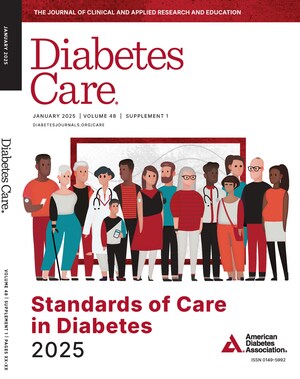ARLINGTON, Va., Feb. 8, 2017 /PRNewswire-USNewswire/ -- Today, the American Diabetes Association (Association) announced $9.75 million to six recipients of the 2017 Pathway to Stop Diabetes (Pathway) research grants, providing $1.625 million to each scientist over a five- to seven-year grant term to spur breakthroughs in clinical science, technology, diabetes care and potential cures. Pathway grants are awarded in three categories: 1) Pathway Initiator, for postdoctoral fellows who are transitioning from training to research; 2) Pathway Accelerator, for diabetes researchers early in their independent careers; and 3) Pathway Visionary, for scientists established in another field who are interested in applying their expertise to diabetes research for the first time.
"Pathway to Stop Diabetes is a unique program in the fight against diabetes. The Pathway program provides exceptional researchers with multiyear grants that allow them to follow the science where it leads them," said C. Ronald Kahn, MD, chair of the Association's Mentor Advisory Group, which advises the Association on Pathway, senior investigator and past president of the Joslin Diabetes Center, and the Mary K. Iacocca Professor of Medicine at Harvard Medical School. "We are excited to build upon the already remarkable portfolio of individuals and research from our previous Pathway awardees. The substantial level of research support and flexibility enabled by Pathway provide opportunities to locate the hidden clues that can lead to innovative advancements that could improve outcomes for millions of people with diabetes, prediabetes and diabetes complications."
Now in its fourth year, the program is supporting six new grant recipients starting their projects in 2017:
- Jonathan N. Flak, PhD, University of Michigan, in Ann Arbor, received a Pathway Initiator Award for his basic research project titled, "Targeting the VMN to Understand Hypoglycemia Pathogenesis."
- Aleksandar David Kostic, PhD, Joslin Diabetes Center, in Boston, received a Pathway Initiator Award for his basic research project titled, "Generation of an in vivo System for Dissection of the Human Type 1 Diabetes-associated Microbiome."
- Paul Cohen, MD, PhD, The Rockefeller University, in New York, received a Pathway Accelerator Award for his basic research project titled, "Dissecting the Role of Beige Fat in Metabolic Homeostasis."
- Sarah A. Stanley, MD, PhD, Icahn School of Medicine at Mount Sinai, in New York, received a Pathway Accelerator Award for her basic research project titled, "Central Nervous System Regulation of Glucose Metabolism."
- Sumita Pennathur, PhD, University of California, Santa Barbara, received a Pathway Visionary Award for her basic research project titled, "Untethering Diabetes through Innovative Engineering."
- David A. Spiegel, MD, PhD, Yale University School of Medicine, in New Haven, Conn. received a Pathway Visionary Award for his translational research project titled, "Targeting Glucosepane Crosslinks in Diabetes."
Since launching in 2013 and including the six 2017 awardees, Pathway has awarded more than $36 million to 23 leading scientists. Each awardee is selected from a highly competitive application pool of only one nominee per institution; approximately 100 applications are received each year. Their list of accomplishments to-date is notable:
- Five Pathway Initiator awardees secured their first independent faculty positions;
- Three patents have been filed by Pathway scientists to protect the intellectual property they have uncovered; and
- Nearly 40 manuscripts published in peer-reviewed journals by Pathway awardees.
The scientific contributions include notable advances in developing a "smart insulin" patch; identifying a molecular trigger for the autoimmune attack that causes type 1 diabetes; linking genetic and environmental factors to development of type 2 diabetes; and uncovering how diabetes causes blindness, among other complications.
The Pathway program is supported by more than $40 million in contributions from corporate sponsors Sanofi, Novo Nordisk, the Eli Lilly and Company Foundation, Merck, and AstraZeneca, along with generous philanthropic support from individuals and foundations. The funds allow the Pathway grant program to extend support to individuals who are just starting their independent research careers, as well as to exceptional scientists already established in other fields of research who want to apply their expertise to diabetes.
"Sanofi applauds the latest class of Pathway to Stop Diabetes award recipients and is looking forward to all of their accomplishments in scientific research that will help people living with diabetes," said Philip Larsen MD, PhD, senior vice president and global head of diabetes research and translational science with Sanofi. "We are encouraged by the work we have already seen coming from the previous Pathways classes and are confident that this new group of researchers will bring even more innovative solutions that could improve diabetes care."
"People living with diabetes need information, support and access to medicines to lead healthy and fulfilling lives," said Todd Hobbs, MD, chief medical officer, Novo Nordisk Inc. "We're proud to support the Pathway to Stop Diabetes program and its research that could help improve the lives of 30 million Americans currently living with the disease."
Pathway grant recipients are selected by a Mentor Advisory Group—eminent scientists from diabetes and other fields who review the core elements of exceptional science in picking an applicant: rigorous thought processes, keen intellect, and capacity for innovation, creativity and productivity. The advisors also provide the Pathway grant recipients with mentorship and scientific and professional guidance during their grant's term. In addition to the substantial and flexible financial support and mentorship, Pathway provides grant recipients with networks for communication and collaboration, special symposia and speaking engagements, and unique collaborative opportunities that will accelerate the advancement and translation of their science, and lead to breakthrough discoveries.
"Lilly is proud to continue as a partner with the ADA in supporting research that has the potential to benefit the millions of people worldwide who live with diabetes or who may be at high risk for diabetes and its complications," said David Kendall, MD, vice president, global medical affairs, Lilly Diabetes. "The Pathway Research Grant program is an important opportunity for creativity and innovation in research, which is key to addressing the diabetes epidemic itself and to making life better for those living with diabetes. On behalf of the diabetes community and Lilly Diabetes, we are pleased to support the efforts of these talented scientists."
"While advancements in diabetes research are making a remarkable difference, the fight against diabetes is not an easy undertaking. Merck commends innovative research efforts to advance diabetes care, and is proud to continue to support the Pathway award scientists," said Sam Engel, MD, associate vice president, Merck clinical research, diabetes and endocrinology.
The Association is now accepting nominations for the 2018 class of Pathway awardees. The Pathway program seeks to bring new investigators and new perspectives to diabetes research. Supporting scientists with different backgrounds and experience is critical to achieving that objective. Pathway accepts nominations for exceptional investigators with medical and scientific backgrounds who propose innovative basic, clinical, translational, behavioral, epidemiological and health services research relevant to any type of diabetes, diabetes-related disease state or complication. Pathway solicits nominations for candidates in all disciplines as applied to diabetes, from medicine, biology and chemistry to engineering, mathematics and physics. In addition, nomination of scientists from diverse backgrounds, including minority groups that are underrepresented in biomedical research, is strongly encouraged. Applicants must be nominated by a U.S. accredited academic and non-profit research institution prior to submitting an application. Institutions may nominate a maximum of one investigator per grant cycle. For more information on the nomination process, visit diabetes.org/pathway.
"AstraZeneca recognizes the need for a broader approach to diabetes management and is proud to work with the American Diabetes Association on Pathway to Stop Diabetes," said Mike Crichton, vice president, cardio-metabolic disease, AstraZeneca US. "We are committed to progressing science that may ultimately lead to innovative solutions and treatment options that address the many complexities associated with living with and treating diabetes."
For more information about the Pathway to Stop Diabetes grant program, visit diabetes.org/pathway.
About the American Diabetes Association
The American Diabetes Association is leading the fight to Stop Diabetes® and its deadly consequences and fighting for those affected by diabetes. The Association funds research to prevent, cure and manage diabetes; delivers services to hundreds of communities; provides objective and credible information; and gives voice to those denied their rights because of diabetes. Founded in 1940, the Association's mission is to prevent and cure diabetes, and to improve the lives of all people affected by diabetes. For more information, please call the American Diabetes Association at 1-800-DIABETES (800-342-2383) or visit diabetes.org. Information from both of these sources is available in English and Spanish. Find us on Facebook (American Diabetes Association), Twitter (@AmDiabetesAssn) and Instagram (@AmDiabetesAssn).
SOURCE American Diabetes Association
Related Links
WANT YOUR COMPANY'S NEWS FEATURED ON PRNEWSWIRE.COM?
Newsrooms &
Influencers
Digital Media
Outlets
Journalists
Opted In





Share this article